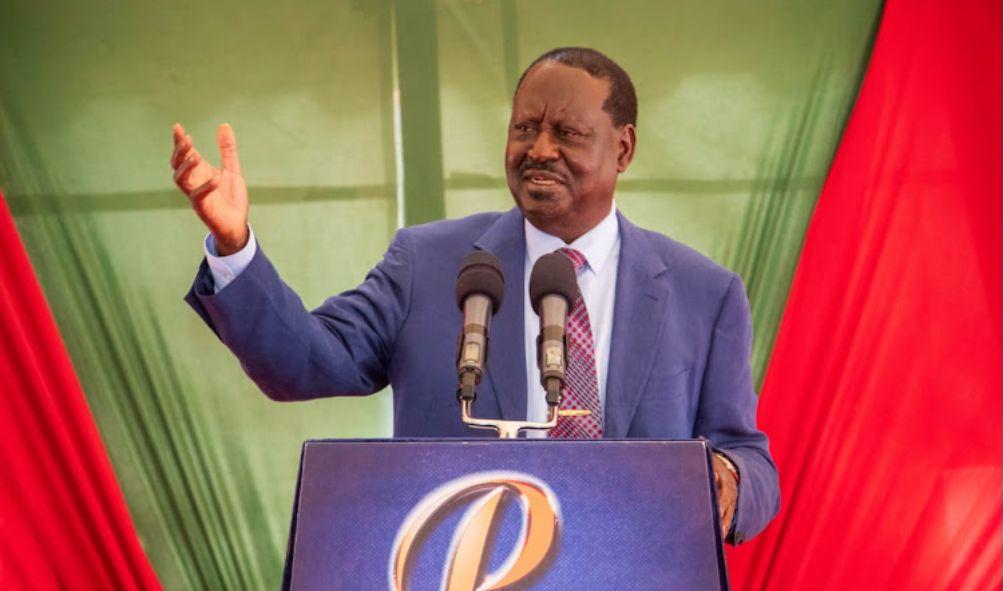Raila Odinga Exposes Shady ‘G-to-G’ Oil Deal Sparking Fuel Price Surge
Raila Odinga, leader of the Azimio La Umoja coalition, has accused the procurement of hydrocarbon products under the ostensibly signed government-to-government agreement between Kenya and Saudi Arabia of a grand fraud.
During a Thursday media briefing hosted by the Jaramogi Oginga Odinga Foundation, he claimed that the secret agreement was causing fuel prices to rise in the country while providing preferential treatment to clandestine government officials.
Raila asserted in his statement that the agreement between the Energy Ministry and state-owned enterprises in the Middle East was signed by the Energy Ministry and not Kenya. Neither the UAE nor Saudi Arabia signed the agreement, he added.
According to him, the Kenya Kwanza government subsequently classified the transaction as a government-to-government agreement so that three Kenyan corporations could be exempt from paying 30% corporate tax.
“There was no G-to-G. Kenya did not sign any contracts with Saudi Arabia or the UAE. Only the Ministry of Energy and Petroleum signed a deal with state-owned petroleum companies in the Middle East,” he told the media.
“Why Ruto chose to characterize the deal as a G-to-G is the first red flag that points to mischief in this deal.”
Notwithstanding the deal’s purported panacea status in addressing Kenya’s escalating petroleum crisis, prices persisted and the Kenyan shilling’s depreciation against the dollar persisted, according to Raila.
ALSO READ:
- Mudavadi Addresses Allegations Tied to USD 439 Trillion Scam Suspect
- Ruto’s Advisors, Including David Ndii, Set for Ksh 622M Earnings as Per Supplementary Budget
“When Ruto initiated this deal, the US-dollar to Kenya-shilling exchange rate was Ksh.132. Today, six months later, it is Ksh.159 to the dollar,” he added.
“The cost of fuel shot up significantly after the deal. Why have things moved from bad to worse since the deal?”
The opposition leader additionally raised concerns regarding the selection process for local logistics, claiming that Gulf Energy, Galana Oil Kenya Ltd., and Oryx Energies Kenya Limited were “handpicked distributors” who sold oil for almost double the price offered by bulk suppliers.
“We know that in August this year, four months after the deal, the government allowed Oryx Energies to sell oil at prices that had been inflated by 17 percent,” Raila said in the media statement.
“In the Ruto deal, Oryx is the supplier of diesel to other oil marketing companies (OMCs) in the country. The excuse was the delay in discharging fuel at the jetty,”
Fuel prices throughout the nation have increased, according to Raila, as a consequence of the Energy Ministry’s decision to change the billing month so that oil companies could quote higher prices.
“For instance, cargo that was bought in July when the price was low is allowed to quote higher August prices and pass the burden to the consumer,” he said.
Raila additionally addressed the Ugandan government’s determination to investigate alternative sources of petroleum products after alleging price escalation by Kenyan intermediaries.
Raila asserts that the intermediaries President Museveni mentioned are government officials responsible for the 59% price escalation.
ALSO READ:
- MPs Greenlight Police Deployment to Aid Haiti Crisis
- IMF Boosts Kenya with Extra Ksh 142.8B Fund Injection
“The change of route by landlocked trading partners will force several Kenyan Oil Marketing companies and logistics firms to close shop,” he added.
“Of course, this leads to job losses, loss of foreign exchange, loss of revenue for the country as a result of KPC losing transit share.”
The leader of the opposition has demanded that the government terminate the “government-to-government agreement in favor of the previous model, which utilized a competitive procurement process,” as a means of addressing the escalating issue that, in his opinion, could only worsen.
“The open tender system was efficient, accountable, and competitive and offered prices commensurate with the international pricing model,” he commented.
Moreover, he has demanded that the anti-corruption agency of Kenya, EACC, investigate the agreement’s parameters and the parties that stand to benefit from it.
Furthermore, he has requested that an additional inquiry be conducted to verify the tax compliance of the three entities that were engaged in the transaction.
“The men and women who came up with this self-serving deal must be surcharged and sacked,” he added.
“EACC and the Directorate of Criminal Investigations must investigate the tax compliance status and pricing model of the three oil companies.”
Raila has additionally demanded that the government provide a comprehensive synopsis of the ramifications that Uganda’s choice to obtain a significant portion of its petroleum requirements via the Tanzanian Central Corridor will entail for our country, specifically concerning the future of the Kenya Pipeline Company.
Raila Odinga Exposes Shady ‘G-to-G’ Oil Deal Sparking Fuel Price Surge
